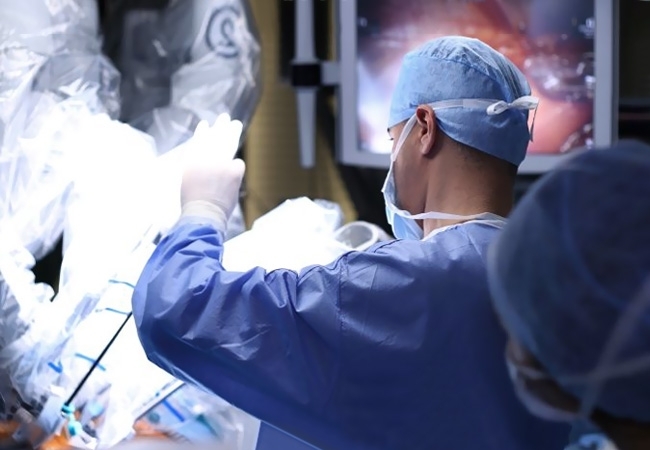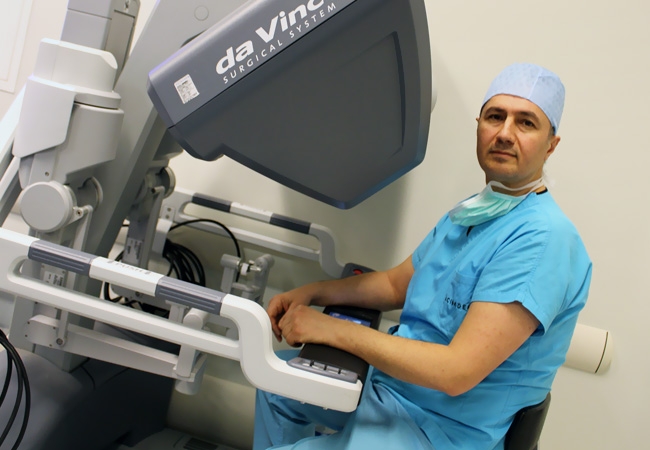The word “laparoscopy” is composed of two words: “laparo” and “scopy”. “Laparo” means abdominal cavity while “scopy” means to see, to observe. So the word “laparoscopy” means the visualization of intraabdominal cavity and it is usually called closed surgery by public.
At the beginning of laparoscopic surgery, a tiny tubule is inserted through the abdominal wall and air is filled inside it. This enables the enlargement of the abdominal cavity so that other surgical instruments can be easily placed inside and brought to the target organ. Insufflation of air inside the abdominal cavity can irritate patient, so general anesthesia is mainly preferred during the procedure.
A hole with an approximate size of 10 mm on the anterior abdominal wall is used for endoscopy camera entrance and for visualizing internal organs. Additionally, holes of 5mm and 10 mm in size are necessary for the use of other instruments. No other incision is needed for the operation, so it is called “bloodless surgery” or “bladeless surgery” in public. In medical literature, those laparoscopic surgeries are mainly called minimally invasive surgeries.
Laparoscopic surgical methods may be used for surgeries of abdominal organs. Gall bladder, reflux, gastric cancer, spleen, hernia, appendix, liver and pancreas surgeries may be performed by laparoscopic approaches. Moreover, obstetrics and gynecological surgeries as ovarian, uterine and tubal surgeries may also be performed in a laparoscopic fashion by obstetricians.
As for urology; prostate cancer (laparoscopic radical prostatectomy),renal cancer (laparoscopic radical/partial nephrectomy),testicular cancer (laparoscopic retroperitoneal lymphadenectomy),bladder cancer (laparoscopic radical cystectomy),uretero-pelvic stricture (laparoscopic pyeloplasty),nonfunctional kidney (laparoscopic nephrectomy),adrenal gland (laparoscopic adrenalectomy) and undescended testis (diagnostic laparoscopy and laparoscopic orchiopexy) surgeries may be performed by laparoscopic approaches.
After performing laparoscopic surgery, because of intraabdominal abscess and intraabdominal strictures, technical difficulties may result in the interruption of the procedure and may necessitate a switch to open surgery. To minimize such risks and to obtain more successful results, laparoscopic surgery should be performed by an experienced surgeon and a team.
As a summary for the historical evaluation of laparoscopic surgery, it was previously a diagnostic method but nowadays nearly all urological surgeries may be performed safely by a standard laparoscopic approach.
The innovative medical technology also brings about amazing innovations in laparoscopic surgeries with smaller instruments, smaller transabdominal access holes and more comfortable satisfied patients.
Conventional open surgery requires a large incision including the skin, subcutaneous tissue, peritoneum and abdominal muscles. Metal surgical instruments called ‘’retractors’’ are needed to protect healthy tissues and organs against the surgical side and enable a wide, open and safe region for the surgery. Those instruments also may cause pain during the post-operative period. Abdominal muscle incisions are usually very painful. Sometimes, this pain even lasts longer in the postoperative period.
As compared to the open surgery, the incision is smaller, postoperative pain is less, hospital stay is shorter and postoperative recovery is faster in laparoscopic surgery.
Almost there is no incisional hernia risk because of small incisions. Even with cosmetic advantages, laparoscopic surgery is preferred by many patients nowadays.

Renal tumor surgeries are planned according to patient age, general health status, and the invasiveness of the tumor. Different treatment modalities are currently in use, but for a localized renal cancer, the gold-standard treatment is surgery.
MORE
Each surgery has rational methods and permanent steps accepted in time by its specialists. A new era has taken place for laparoscopic renal surgery by the “Tunc Technique” as it caused a change in classical steps and led to the requestioning of even anatomic landmarks. Advantages of this technique are well-documented in the literature.
MORE